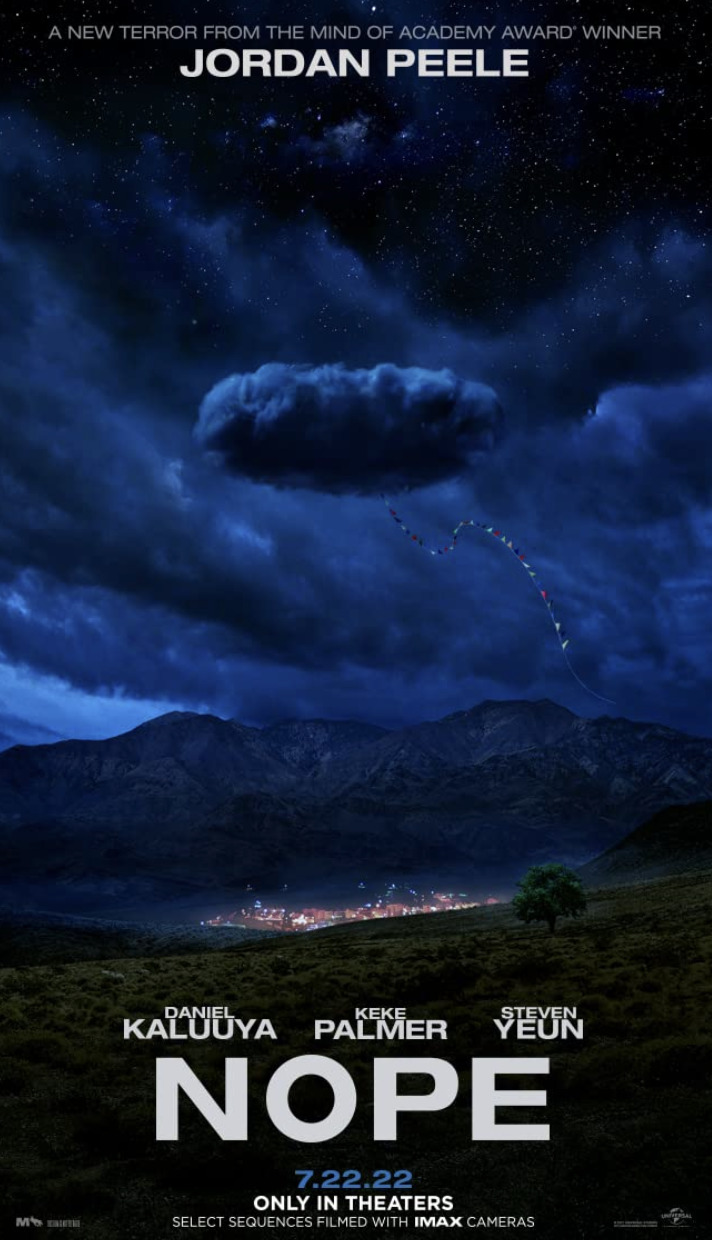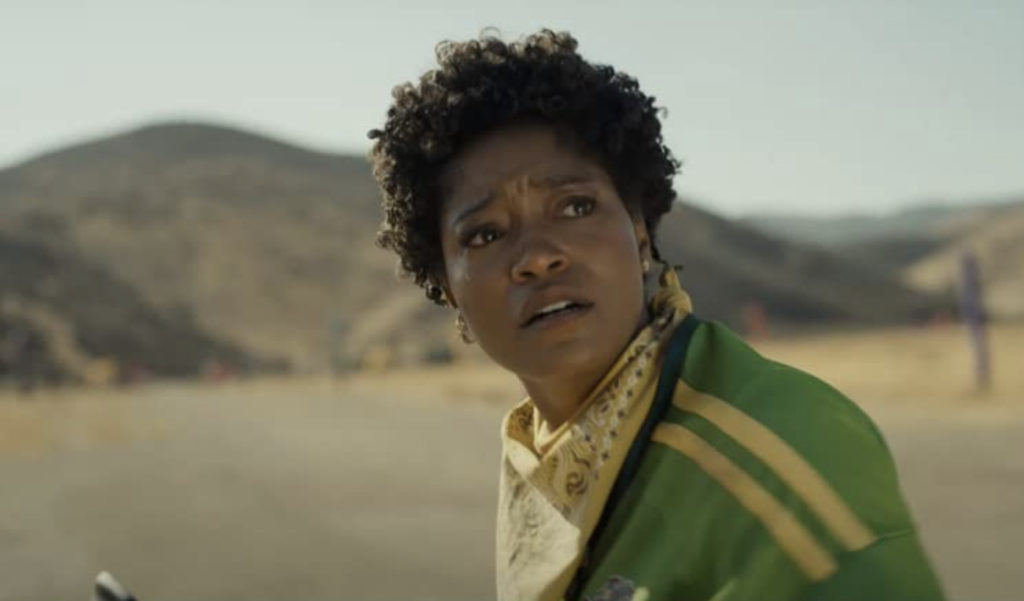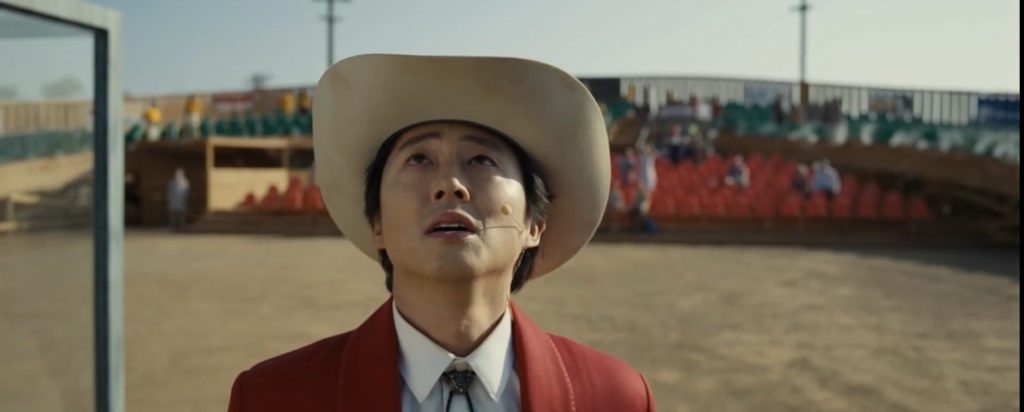
People bearing witness to an uncanny and chilling discovery that defines their identities is the powerful message both in front of, and behind, the camera of acclaimed, Oscar-winning genre filmmaker Jordan Peele’s latest genre feature, Nope. The epic sci-fi horror movie, which marks the filmmaker’s third feature as the writer-director-producer, highlights his innate ability to continue making astoundingly unique projects that blend diverse subgenres and emphasize contemporary social commentary in its character and plot developments.
Nope follows the daily operations of the Hollywood Horses ranch, which trains and handles horses for film and television productions. Owner Otis Haywood Sr. (Keith David) and his son, Otis Haywood Jr. (David Kaluuya, who was nominated for the Best Actor Academy Award for his role in Peele’s first movie, Get Out), who goes by the nickname O.J., spend their days caring for their stable of mares and stallions.
After his father then suddenly dies in a mysterious accident that occurred on the ranch, O.J., a quiet wrangler, reunites with his estranged sister, Emerald (Keke Palmer), an outgoing aspiring actress-singer, in order to take over the business. She tries to convince her brother to sell the Hollywood Horses ranch ranch to their neighbor, Ricky “Jupe” Park (Steven Yeun). However, OJ refutes his sister’s suggestion that they sell the ranch to Jupe, a former child sitcom actor who now owns and operates the small theme park Jupiter’s Claim, and conducted business deals with Otis.
Despite the siblings’ differences in opinions and personalities, they both begin to notice that their electricity is fluctuating and their horses are vanishing or violently reacting to an unknown presence. They both begin to believe that a UFO has been hovering over Hollywood Horses ranch in plan sight.
So they decide to document evidence of the UFO’s existence. They do so by recruiting Angel Torres (Brandon Perea), a recently heartbroken employee at Fry’s Electronics store, to help set up surveillance cameras around their property.
Despite their differing motivations, the trio learns to work together to collect evidence of the UFO, in order to gain money, fame and most importantly, redemption in their lives.
Palmer, Kaluuya and Perea generously took the time recently to promote the distribution of the drama during virtual press conference interviews. Nope is now play in theaters, courtesy of Universal Pictures.

Q: What was your reaction to being cast in the film?
DK: I felt really blessed because I just wanted to watch it. So Jordan sending me the script and asking me to be in it, and being able to reconnect with him and do genre stuff again, was amazing.
It was a challenge, though, because there were a lot of non-dialogue scenes. But I really enjoyed doing [Nope], especially after [starring in last year’s biographical crime drama,] Judas [and the Black Messiah, for which he won the Best Supporting Actor Oscar].
KP: I feel super blessed and excited to have experienced working with Jordan in this kind of way in this genre, with this kind of character. I really loved what I read on the page of the character that I played, so I was really excited to get to do it.
BP: Jordan thought my initial interpretation of Angel during my first audition was far different from what he wrote. So I got a call-back with Jordan on Zoom, and we read through one of my scenes.
He also added a new scene, as well, and I just had to act scared. He also wrote something like, [Angel] sees a white ghost walking into the frame, and I thought, what kind of movie is he making? I then came to find out that it had nothing to do with ghosts, and he just wanted to see that I could naturally act scared.
I thought the call-back went really well, and waited a day. I then got another call-back for an improv session with Jordan, and I talked to my reps. They said, “Alright, you don’t need to know the dialogue; it’s just an improv session,” and I said, “Okay, cool.”
But I brought my reader just in case. I thought, maybe he does want me to read the scenes, so I’ll be prepared for it.
We were then in the final call-back session…and Jordan asked, “You’re familiar with the scenes, right?” I said, “I am, but I was told this was an improv session.”
He said, “Okay, but I kind of wanted to see you do it again because the character you first brought was far different than what I wrote…So I’d have to rewrite my entire script in order to include the character you brought to the table.”
I said, “That sounds like a lot of work, so you probably don’t want to do that.” He said, “You know what? That’s what I’m going to do.” I was like, “Woah!,” and he said, “You’ve got the job.”
I started crying and said, “I’ve been in this game for a long time, and I’m so thankful for you giving me the opportunity.” I also got Jordan and the reader I brought to cry, but I was so happy to get the job!
Q: How much can you relate to your characters?
BP: The most I can relate to Angel is discovering purpose; I had that point in life, for sure, as I thought, what I am doing? Going through the trials, tribulations and struggles of being a young teenager and trying to figure things out was hard. So I could give light to that feeling.
I also think that Angel and I handle situations far differently. But it was cool to understand and craft a character like Angel, who was relying on needing purpose. I’m truly blessed to have found mine, and glad that Angel found his, as well. They’re far different purposes, but we got to them.
Q: Keke and Daniel, what was it like creating the sibling bond during the filming of Nope?
KP: I think that was the easiest part. I think we have a natural chemistry together. For whatever reason, we just vibe out, and I love picking on Daniel. He’s the funniest person to try to get out of being calm because he’s always so relaxed. So I always like to mess with him.
DK: It was fun process to create our sibling bond. Keke’s a cool person, and I was a fan of hers before we started working together. So when Jordan mentioned she was going to play my [character’s] sister, I was happy.
I also knew that Keke was going to have a moment when we started filming, and that made me happy. I love when people who have a natural talent get their moment. She’s also so open and great at communicating, so I’m glad we were able to work together.

Q: Your characters are so incredibly different. What did you learn from each other, and what was it like working together, as actors while portraying these roles?
BP: It’s a dream come true to have been able to work with the rest of the cast. I look up to my co-stars in so many ways.
I watched a lot of interviews with Daniel, and watch his films all the time. So it was crazy to work with him and get to know him in person.
Keke is the funniest person ever, and it’s crazy how much energy she brings to her performances…She’s so talented, and that’s inspiring to see. I’m so floored by her performance in this film, as it has so many layers.
KP: I learned a lot from Daniel. That’s also why I was so excited when Jordan told me that I was going to be working with Daniel.
I’ll never forget when I watched the Black Mirror episode that he started out on [in 2011]. He really gave such a nuanced performance, so I thought to myself, this is a great actor, and I would love to work with him.
When you work with great actors, they only make you better. So when we did the film, I was very excited about what I was going to learn from him.
He’s a very generous actor. He’ also very patient and listens.
He also trusts himself and doesn’t second guess himself, which I think is so important to do sometimes as an actor. Part of our job is to get approval, or to get someone to say, “That was it.”
But he doesn’t have that; he knows intrinsically what’s right to him, and I think that confidence also encourages the other person who’s watching him. I imagine that works well in his relationship as a filmmaker with Jordan, because he knows what he wants to do, and it’s good to see that.
DK: It’s a very hard to naturally be extroverted while you’re filming; it’s harder than people realize. In terms of being joyous and exuberant, and having a realness to it, is very difficult.
But with Keke, it’s natural – she’s just got it. I was taken in a lot by the decisions she made, and I thought, that’s how you can do that; I didn’t see, or think about, it in that way.
What I also loved about [OJ and Emerald’s] dynamic is that he’s the classic man and she’s the funny woman. Emerald is just running around, doing this and that, and he’s just not. The more that he is not, the funnier it is.
I just love that Jordan wrote it in that way. The two of us also stretched those moments while we were acting on set.
Q: Speaking of Jordan, what were your favorite aspects of working with him on set for this film?
KP: He’s a great collaborator. Every director is different, but the way that he’s a leader is by being very collaborative. He has a level of humility that I think empowers everyone on set, while at the same time, we’re all supported by his obvious and clear vision.
But at the same time, he encourages us to take our artistic liberty and interpret it and what we can do with it. He also allows us to inform him about the characters he created. He really trusts the actors, and also the cinematographer and the rest of the crew.
So his collaboration is to be admired.
DK: He is one of the most collaborative directors I’ve worked with. He knows that the actors see things from a different point-of-view, and he wants to hear it.
A lot of the things we would say about our characters is already in the script, but since he’s so close to it, we’re seeing it from a different point-of-view. He’ll then say, “Oh, I see,” and becomes more aware about what he’s already doing.
BP: Seeing how collaborative he is was one of the most surprising things I learned about Jordan on set. You wouldn’t expect that from such a detailed director…but I learned that you can be detailed while still being collaborative. That was a great lesson I learned from Jordan.
I never expected him to be open to so many ideas, and be so communicative. I thought he’d be like, “I know what I need and what I need to do.”
But he was very inclusive and was like, “What do you think about this? What if I did this?” So it was cool that he really respected my opinion.

Q: Daniel, this is your second movie with Jordan. How was the experience of working with him on Nope different than your previous collaboration with him [on Get Out]?
DK: [Nope] was just bigger. Jordan was more confident, and I understood what it meant to carry a scene more. The IMAX cameras were also different. So everything about it was much bigger, but we still cared about the intimate characters and their relationships.
Q: Nope gives a unique commentary on the film industry, especially the need to feel seen in it. How does the story relate to your journey as actors?
KP: It related to me a lot, especially for when I was a kid, and how I interpreted what being seen was, as opposed to actually being seen for who I am. In terms of having high levels of popularity and fame, especially in the era we’re in now, everyone thinks they want to be seen in that way.
But you actually become the most unseen in those scenarios, and I’ve learned that first hand. I really love how we explore that in the film, because my relationship with being seen is so different from when I did my first big film when I was 11-years-old.
DK: In terms of being seen, people think you can only do what they’ve already seen you do, and then you feel unseen. You can make something up in the moment on set, and then people don’t see that; they just think that’s really you. So you’re really not seen for who you are.
Then when OJ started engaging with the object, in the way that he thought it was, it changed his relationship with it, and how much it showed itself.
Q: Where there any challenges that you faced while making this movie?
BP: While making this film was amazing, there were some challenges on this set; there were times when we had rewrites, and Jordan had new pages.
It would be a whole new page of dialogue that I would get when I was on set. I would be in my trailer, and they said, “We’re about to film this scene next, and Jordan has these new pages for you.”
I would grab them and think, I just memorized all of my lines the night before, and now they’re all changed; these are paragraphs! He’d be like, “Yes, I added more dialogue for you – it’s a bigger scene for you!,” and close the door. I’d think, okay, game time; I have to memorize all this stuff right now.
That was the biggest challenge, but also the most rewarding. Now I have no fear going onto sets. I think, if I can get whole new pages that had paragraphs of new dialogue and still deliver at a good level, it makes me better at my craft, and I’m more confident now.
Check out more of Karen’s articles.
Here’s the trailer of the film.

